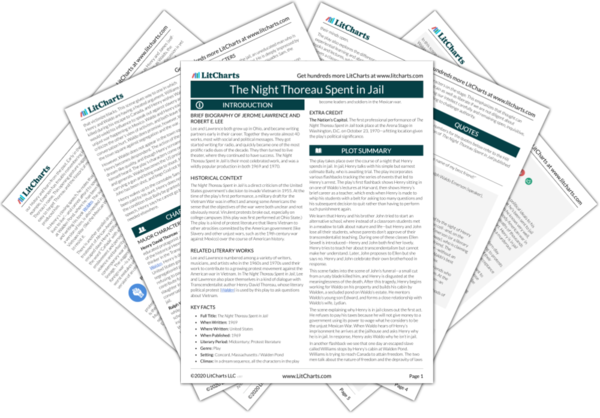This play is a resounding warning against complacency and conformity. Though it wonders about how best to resist authority, effect change, and educate, it is always steadfast in its stand against complacency, declaring that to obey your government without question is to be complicit in the crimes your government may commit. Henry is adamant that Waldo, by refusing to speak out against the war, is effectively endorsing it. This image is confirmed and underscored by the climactic dream scene in the second act, in which the play’s characters become commanders, generals, and soldiers in the Mexican War. Each of them directly participates in the killing. Waldo even becomes the president—meaning that within the world of the dream, he assumes responsibility for the entire war, with the clear suggestion that by not advocating against the war he is therefore responsible for it.
The play insists that these are the stakes of complacency: blind obedience is the equivalent of active endorsement. We are all responsible for the actions of our government. Once again this is a striking message to Vietnam-era Americans, that ambivalence has no place in this social and political climate.
Complacency, Conformity, and Responsibility ThemeTracker

Complacency, Conformity, and Responsibility Quotes in The Night Thoreau Spent in Jail
“Cast conformity behind you!”
“Cast…Conformity…Behind You…!”
I want to be as much as possible like Ralph Waldo Emerson.
I refuse to commit murder. That’s why I’m here.
For you and me, deacon, the declaration of Independence has already been written. Young Thoreau has to declare it every day.
I gotta git to Cañada!
Always do the right thing, even if it’s wrong.
Seems to me I’ve got several more lives to live.











